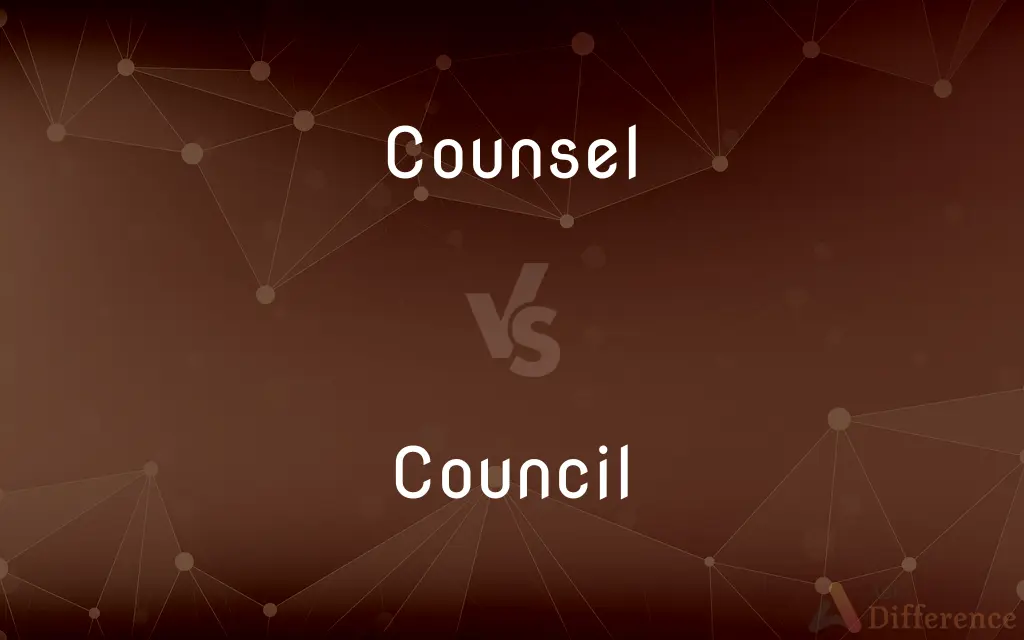Counsel vs. Council — What's the Difference?
Edited by Tayyaba Rehman — By Fiza Rafique — Updated on November 1, 2023
Counsel refers to advice or legal assistance; council is a group assembled for advice or governance.

Difference Between Counsel and Council
Table of Contents
ADVERTISEMENT
Key Differences
Counsel often implies a form of guidance or support, typically in a legal context. A lawyer may provide legal counsel, advising clients on matters of law. Conversely, a council is an assembly or a group of people convened for consultation or deliberation. The council could be a local governing body or a committee formed to make decisions.
Individuals seek counsel when they require expertise or advice on specific issues, such as legal or psychological counsel. In contrast, a council gathers multiple perspectives and expertise, aimed at broader decision-making or governance. While counsel is sought for personal or corporate guidance, a council's resolutions affect the larger community or organization it represents.
Counsel can also be a verb, meaning to give advice or guidance. Professionals, such as counselors or attorneys, counsel others as part of their occupations. On the flip side, a council does not function as a verb; it is strictly a noun, referring to the collective body or the meeting itself.
The effectiveness of counsel is often judged on the quality of advice or defense provided, as seen in legal outcomes or the resolution of personal issues. The effectiveness of a council, however, is measured by its governance, policies it enacts, or the communal issues it resolves.
Counsel and council should not be confused, although they sound similar. They represent very distinct concepts: counsel is about the act of advising, while a council pertains to a body of individuals assembled for deliberation or governance.
ADVERTISEMENT
Comparison Chart
Definition
Advice or legal assistance.
A group assembled for advice or governance.
Usage
Can be a verb or a noun.
Always a noun.
Function
To provide guidance or advice.
To deliberate and make decisions.
Context
Often legal or therapeutic.
Administrative, legislative, or advisory.
Professional Role
Lawyers, therapists, advisors.
Councillors, committee members.
Compare with Definitions
Counsel
Advice or guidance given, especially legally.
She sought the counsel of her attorney.
Council
A group of people convened for advice or governance.
The city council voted on the new zoning laws.
Counsel
To give advice or guidance to someone.
He counseled the students on their career options.
Council
An assembly of people brought together for discussion.
The council met to discuss the community issues.
Counsel
The act of exchanging ideas or giving advice.
The teacher took the student into counsel.
Council
A body elected or appointed to make decisions or advise.
The student council is organizing a charity event.
Counsel
Private thoughts or plans.
She kept her own counsel on the matter.
Council
A meeting for consultation or advice.
The emergency council convened at midnight.
Counsel
A counsel or a counsellor at law is a person who gives advice and deals with various issues, particularly in legal matters. It is a title often used interchangeably with the title of lawyer.
Council
The administrative body governing a city or town.
The council announced a new initiative for recycling.
Counsel
The act of exchanging opinions and ideas; consultation
Joined in counsel with colleagues before deciding the issue.
Council
A council is a group of people who come together to consult, deliberate, or make decisions. A council may function as a legislature, especially at a town, city or county/shire level, but most legislative bodies at the state/provincial or national level are not considered councils.
Counsel
Advice or guidance, especially as solicited from a knowledgeable person.
Council
An assembly of persons called together for consultation, deliberation, or discussion.
Counsel
Private, guarded thoughts or opinions
Keep one's own counsel.
Council
A body of people elected or appointed to serve as administrators, legislators, or advisers.
Counsel
A lawyer or group of lawyers giving legal advice and especially conducting a case in court.
Council
An assembly of church officials and theologians convened for regulating matters of doctrine and discipline.
Counsel
To give counsel to; advise
Counseled us to be prudent.
Council
The discussion or deliberation that takes place in such an assembly or body.
Counsel
To recommend
Counseled care in the forthcoming negotiations.
Council
A committee that leads or governs (e.g. city council, student council).
Counsel
To give or take advice. See Usage Note at council.
Council
Discussion or deliberation.
Counsel
The exchange of opinions and advice especially in legal issues; consultation.
Council
An assembly of men summoned or convened for consultation, deliberation, or advice; as, a council of physicians for consultation in a critical case.
Counsel
Exercise of judgment; prudence.
Council
A body of man elected or appointed to constitute an advisory or a legislative assembly; as, a governor's council; a city council.
An old lord of the council rated me the other day.
Counsel
Advice; guidance.
Council
Act of deliberating; deliberation; consultation.
Satan . . . void of rest,His potentates to council called by night.
O great in action and in council wise.
Counsel
Deliberate purpose; design; intent; scheme; plan.
Council
A body serving in an administrative capacity;
Student council
Counsel
A lawyer, as in King's Counsel (KC) or Queen's Counsel (QC).
Council
(Christianity) an assembly or theologians and bishops and other representative of different churches or dioceses that is convened to regulate matters of discipline or doctrine
Counsel
(transitive) To give advice, especially professional advice, to (somebody).
The lawyer counselled his client to remain silent.
Psychiatrists, psychologists, social workers and other mental health professionals counsel clients.
Council
A meeting of people for consultation;
Emergency council
Counsel
(transitive) To recommend (a course of action).
I would counsel prudence in this matter.
Counsel
Interchange of opinions; mutual advising; consultation.
All the chief priest and elders of the people took counsel against Jesus, to put him to death.
Counsel
Examination of consequences; exercise of deliberate judgment; prudence.
They all confess, therefore, in the working of that first cause, that counsel is used.
Counsel
Result of consultation; advice; instruction.
I like thy counsel; well hast thou advised.
It was ill counsel had misled the girl.
Counsel
Deliberate purpose; design; intent; scheme; plan.
The counsel of the Lord standeth forever.
The counsels of the wicked are deceit.
Counsel
A secret opinion or purpose; a private matter.
Thilke lord . . . to whom no counsel may be hid.
Counsel
One who gives advice, especially in legal matters; one professionally engaged in the trial or management of a cause in court; also, collectively, the legal advocates united in the management of a case; as, the defendant has able counsel.
The King found his counsel as refractory as his judges.
The players can not keep counsel: they 'll tell all.
Counsel
To give advice to; to advice, admonish, or instruct, as a person.
Good sir, I do in friendship counsel youTo leave this place.
Counsel
To advise or recommend, as an act or course.
They who counsel war.
Thus Belial, with words clothed in reason's garb,Counseled ignoble ease and peaceful sloth.
Counsel
A lawyer who pleads cases in court
Counsel
Something that provides direction or advice as to a decision or course of action
Counsel
Give advice to;
The teacher counsels troubled students
The lawyer counselled me when I was accused of tax fraud
Counsel
An attorney, especially in a court.
The judge addressed the counsel for the defense.
Common Curiosities
Can counsel be used as a verb?
Yes, to counsel someone means to give them advice or guidance.
What is the role of counsel in court?
In court, counsel refers to lawyers who represent and advise their clients.
What kind of issues would I seek counsel for?
You might seek counsel for legal matters, personal advice, or professional guidance.
How often does a council meet?
It depends on the council, but many meet regularly, such as monthly or weekly.
Do all legal proceedings require counsel?
Not all, but having legal counsel is advisable in most proceedings.
What's the difference between a councilor and counsel?
A councilor is a member of a council; counsel refers to advice or legal representation.
Can counsel be a group of people?
Yes, in a legal sense, counsel can refer to a group of lawyers.
What does a city council do?
A city council makes decisions and sets policies for local governance.
Is a council always related to government?
Not always; councils can be in non-governmental organizations for decision-making.
Who can act as legal counsel?
Only those licensed to practice law can act as legal counsel.
Is a council decision final?
Council decisions are generally final unless overturned by a higher authority or court.
How are members of a council chosen?
Council members can be elected by voters or appointed by higher authorities.
Can anyone be a part of a council?
Membership often requires election, appointment, or specific qualifications.
Do councils have the power to enforce laws?
Some councils have enforcement powers, while others are purely advisory.
Can counsel also mean to keep a secret?
Yes, 'to keep one’s own counsel' means to keep one’s thoughts or plans private.
Share Your Discovery

Previous Comparison
Dual vs. Duel
Next Comparison
Modelling vs. ModelingAuthor Spotlight
Written by
Fiza RafiqueFiza Rafique is a skilled content writer at AskDifference.com, where she meticulously refines and enhances written pieces. Drawing from her vast editorial expertise, Fiza ensures clarity, accuracy, and precision in every article. Passionate about language, she continually seeks to elevate the quality of content for readers worldwide.
Edited by
Tayyaba RehmanTayyaba Rehman is a distinguished writer, currently serving as a primary contributor to askdifference.com. As a researcher in semantics and etymology, Tayyaba's passion for the complexity of languages and their distinctions has found a perfect home on the platform. Tayyaba delves into the intricacies of language, distinguishing between commonly confused words and phrases, thereby providing clarity for readers worldwide.















































